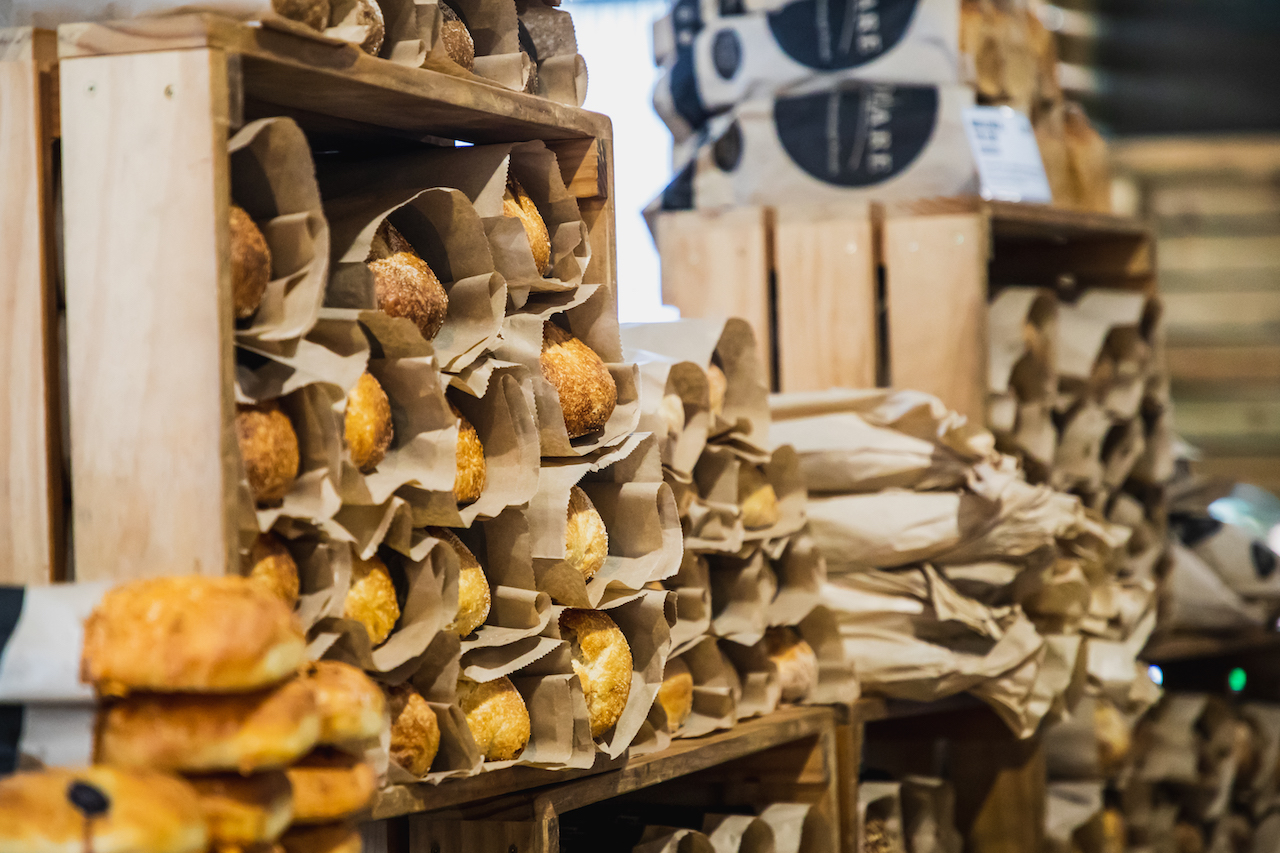
Words Denise Irvine, Images, Images Alex Spodyneiko
On Sunday mornings, I throw my sturdy jute shopping bag into the car and join the crowds at Hamilton Farmers Market.
My bag is close to seven or eight years old, printed with a Waikato Food Inc logo and the message, Buy Local Eat Local. Which makes it the perfect market bag. Pretty much everything goes in loose. Why would you need plastic bags?
Broccoli heads nestle gently into apples, pak choi, baby carrots, avocados, cheese, recyclable punnets of strawberries, and a paper bag with potatoes. At the Raglan Fish truck, my tarakihi is double-wrapped in paper. It finds a possie in the bag, too.
Sustainable practices at Waikato Farmers Markets—held on Saturdays in Cambridge, Sundays in Hamilton—are followed by customers and stallholders wherever possible. By their very nature, the markets reduce food travel miles, they reinforce messaging on managing waste, and participants bring a duty of care to the growing and processing of food.
Market customers do their bit by shopping local and arming themselves with reusable bags, containers for more delicate vegetables, and keep-cups for coffee. Some have their glass milk bottles to hand and head to the Jersey Girls stall for rich, creamy organic A2 milk.
Jersey Girls milk is from the Vosper family’s organic Cleavedale Farm at Matamata, which is committed to low impact farming methods. The milk is sold in fully recyclable PET and glass bottles (available as in-store refills or at the farmers markets).
Market administrator Kathryn Hunter says that little or no packaging is offered by stallholders, although this is product-dependent. Ready-to-eat food is served on bamboo or compostable plates, and the market sells jute bags and produce bags for those needing to refresh their collection.
Kathryn, who has the Quarter Acre Kitchen stall (homemade jams and chutney), takes glass jars—not lids—for recycling, as does Marea Verry at the GoodBugs stall. Marea, who uses spray-free or organic vegetables for her fermented products, is also happy to take food kit packaging (My Food Bag, Hello Fresh, etc) from customers. She recycles the ice packs and protective materials for wrapping GoodBugs’ internet orders.
One of my first stall stops is always to Mike Alexander at Roto-o-rangi Free Range Eggs. His eggs are excellent, and I usually have empty cartons to drop off. Mike’s the man with the Scottish accent and distinctive tweed hat, and he welcomes egg cartons for recycling. He refills them, adds his Roto-o-rangi sticker and best before date. He says, “I’m hoping it’ll save a tree or two.”

Over at The Organic Food Shop (TOFS) stall, they’re walking the talk on sustainability and organics. TOFS’ beef and lamb comes from Pikiroa Organic Farm, a BioGro-certified organic property 40 minutes south of Hamilton that has been owned by the same family for four generations.
Pikiroa Farm is in partnership with TOFS managing director Tori Forshaw, and their shared vision is to supply high quality organic food to customers.
TOFS’ mothership in Frankton incorporates a butchery and bakery. Everything’s done from scratch: the meat is butchered on-site, and the signature organic sourdough, rewana bread, and gourmet pies are made in the adjoining bakery. The only “imported” meat is Bostock Brothers organic chicken, from Tori’s home province of Hawke’s Bay.
TOFS embraces old-school principles of nose-to-tail eating: beef off-cuts are minced and dried for Paddy Wack doggie treats; bones not used for broth are cut and dried for dogs; and lamb bones have a popular following for nourishing lamb broth.
“We use everything,” says Tori. “We hate waste.”
On Sundays, she’s usually on duty at TOFS stall at Hamilton Farmers Market. She loves the connection: “We can name nearly all our customers,” she says. “It is a great little community at the market, and it’s good to see it growing.”
Sweetree Honey stallholders Martin and Stephanie Lynch also make a strong commitment to sustainability through a number of practices such as using glass jars for their honey, wooden frames for the hives (as opposed to plastic), and keeping transport to a minimum.
Sweetree’s hives stay on their apiary site all year and its award-winning small-batch raw honey is unique to its nearby floral sources, offering the “taste of a location”. The locations include Horsham Downs, near Martin and Stephanie’s home; Four Brothers Reserve, between Hamilton and Raglan; the Hakarimata Range, near Huntly; and Ohinewai, in north Waikato, where Martin’s grandfather began the Lynch beekeeping tradition.
There are also hives at Hamilton Zoo, Hamilton Gardens, Taitua Arboretum, and Claudelands Event Centre. In the height of summer, Sweetree adds 1.5 milliion bees to the city, each with a 5km flight range and plenty of pollination potential.
“We like to keep our operation local,” says Stephanie. “It is a lot better for the environment for us to stay local. Our key consideration has always been to reduce and minimise our impact on the environment.”
She says they’re happy to take glass jars from customers at the market to recycle; the jars are used in a jam-making project she works on with friends.
Sustainability is similarly important for Raglan-based Hunt and Gather Bee Company, another of the market’s award-winning honey stallholders. Owners Rory and Hannah O’Brien are non-migratory beekeepers, with their hives mostly staying in one place to ensure year-round bush pollination rather than a seasonal hit. They use glass jars and paper labels and all their hive-ware is wooden, entirely biodegradable at the end of its life.
As well, the O’Briens plant trees to offset their carbon emissions, and they give trees to their host farmers. Hannah says they’ve so far distributed 3,000 trees between host farmers and plantings on their own property at Te Mata. The business is also working towards becoming carbon neutral. “That’s a big goal.”
Everyone at the market is trying to walk a bit more lightly on the planet. “All these things add up,” says Kathryn Hunter. “If everyone does something, it all helps.”




